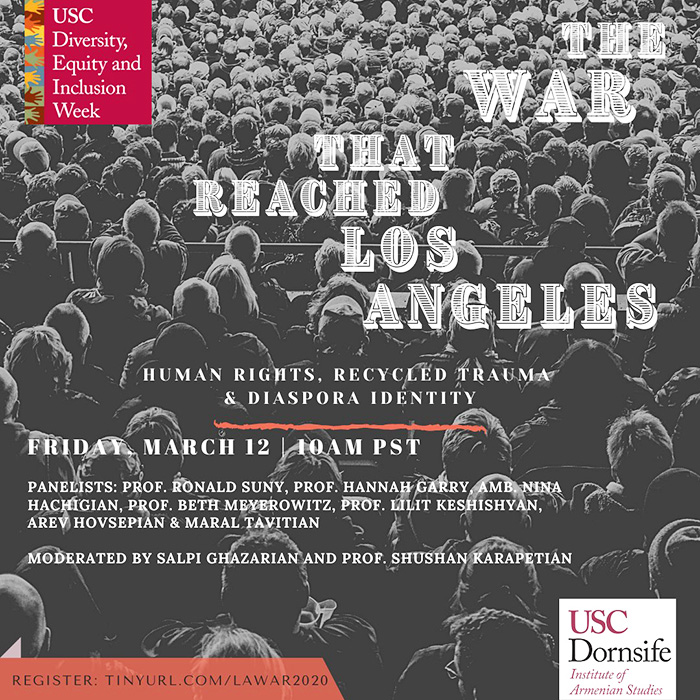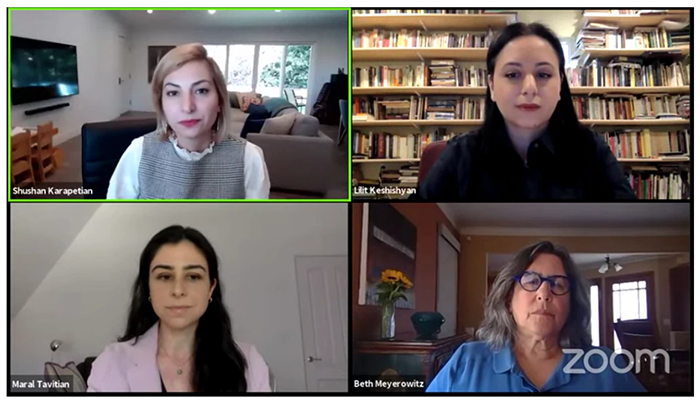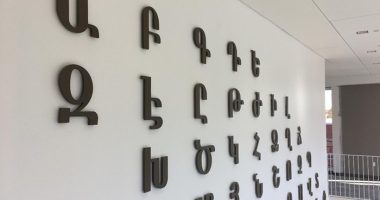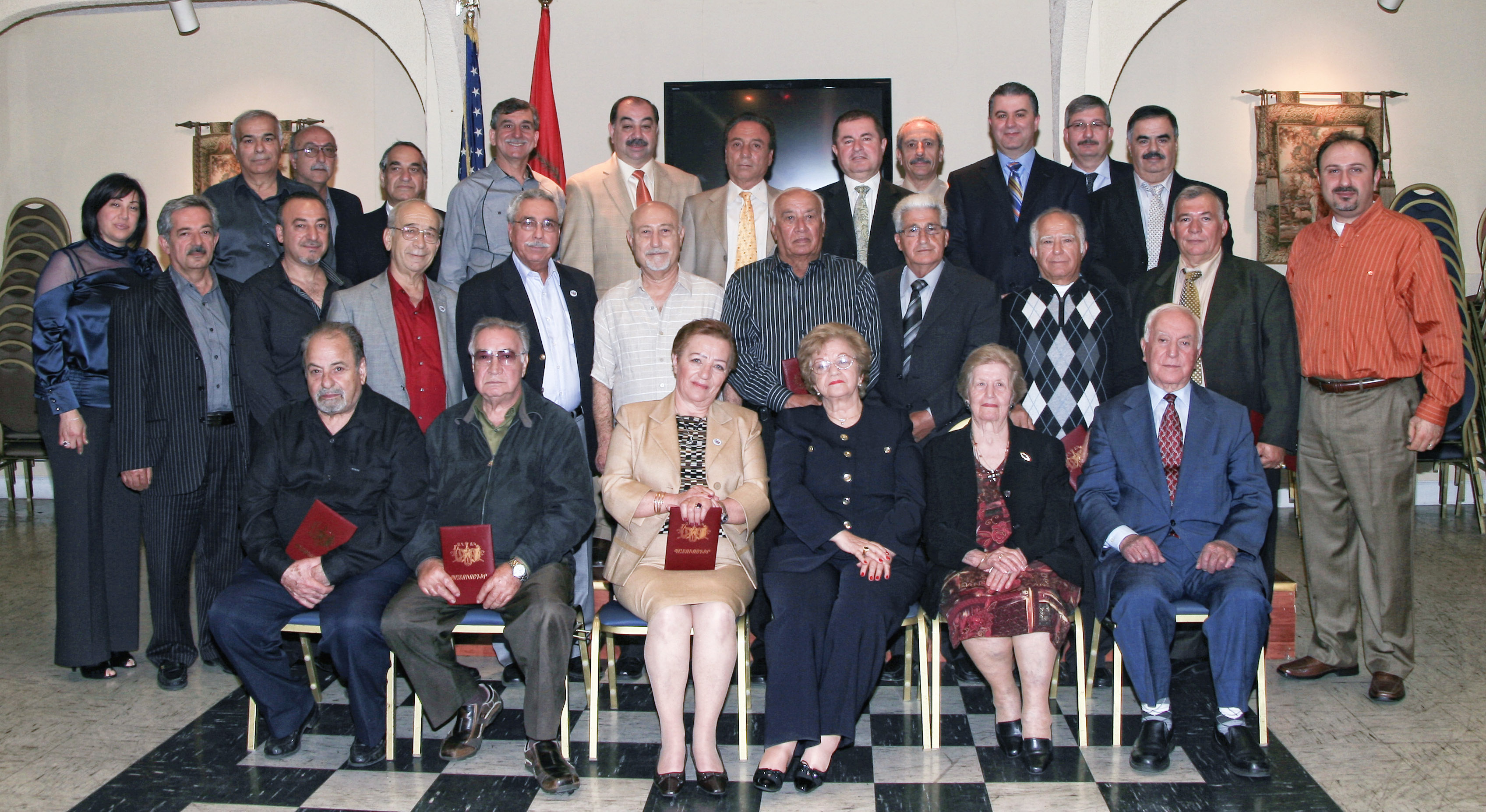BY MELVIN DILANCHIAN
According to experts who joined a discussion on March 12, hosted by USC DEI Week and USC Dornsife Institute of Armenian Studies, absence of diversity, equity and inclusion results in tensions that impact our lives across time and location.
In response to USC Provost Charles Zukoski’s call for submissions for DEI Week discussions, “The War That Reached Los Angeles: Human Rights, Recycled Trauma and Diaspora Identity” unpacked how struggles for equity and rights relate to all Angelenos.
Salpi Ghazarian, the director of the USC Dornsife Institute of Armenian Studies, and panelists extracted universal takeaways regarding equity and inclusion, while examining the Armenian experience.
“In many ways, [the recent violence against indigenous Armenians] is no different from the revolution and violence in Central America that comes to Los Angeles or the Myanmar crackdown that comes to Los Angeles,” Ghazarian said.
“That’s what we were doing throughout 2020. From Ahmaud Arbery to Breonna Taylor to George Floyd all the way to Portland, Kenosha, Minneapolis and Los Angeles,” Ghazarian continued. “At that same time, Armenians demanded the protection of their own basic human and civil rights.”
The large immigrant composition in Los Angeles is one of its greatest strengths that demands attention and solidarity according to Nina Hachigian, Deputy Mayor for International Affairs of Los Angeles and former U.S. ambassador in Southeast Asia.
Hachigian reflected on the recent distress in the Burmese-Myanmar community and the Armenian American community’s struggles that attracted a march of 100,000. “There were BLM protestors for Artsakh, Mexicans for Armenia signs, and I thought ‘only in L.A.,’” she said.
The march decried Azerbaijan’s military offensive, launched on Sept. 27, 2020 against indigenous Armenians of Nagorno-Karabakh or Republic of Artsakh –a region placed within Azerbaijan without the consent of its native Armenians. Many countries signed a UN pact to cease military activities during the pandemic, but Azerbaijan was not one of them. Anti-Armenian hate crimes also spiked in Los Angeles, San Francisco and Lyon.


The struggle for visibility, equity and inclusion, in part, inspired the direction of the first panel’s conversation.
For decades, Nagorno-Karabakh has sought to secede from Azerbaijan based on the right to self-determine its future, while Azerbaijan rejects these efforts on the basis of territorial integrity.
“Ironically, Armenians’ call for independence from Azerbaijan started specifically because of the absence of equity and inclusion for the Armenians of Azerbaijan,” Ghazarian said.
Ronald Suny, a University of Chicago emeritus professor, explained that despite the region being designated as autonomous, its overwhelming majority Armenian populace seldom enjoyed that right.
“It’s not accidental that the poor, people of color or of recent immigration are stigmatized, because they are not enjoying all the fruits of a certain society,” Suny said. “The same is true in Nagorno-Karabakh. The [Armenians] felt vulnerable because they were losing their language and they felt inferior and put upon by [Azerbaijan].”
In Myanmar, peaceful protests against a military coup have been met with violence. According to the USC Shoah Foundation, the military coup places ethnic minorities at risk, while USC students from there faced uncertainty amid WiFi cutoffs.
At USC, concerns of anti-Blackness on campus were also revealed via social media along with conversations about DPS funds and public safety.
USC Gould Professor and Director of International Human Rights Clinic, Hannah Garry, spoke to the power of marginalized groups experiencing systemic oppression uniting to form their own mechanisms to generate actionable change.
“[The events] demonstrate to me how our vote matters in the leaders we elect. The U.S. government was happily funding the ramp up in Azerbaijan. There is big business to be made,” Garry said. “It is incumbent upon us to elect leaders who will not use human rights for political and business purposes.”
After addressing how denial of individuals’ rights to inclusion and equity results in violence, a second panel explored mental health and recycled trauma.
According to USC Professor of Psychology and Preventative Medicine Beth Meyerowitz, historical trauma is marked by living in survival mode as the trauma is transmitted and experienced overtime and across generations by communities with histories of experiencing long-term trauma and oppression.
Meyerowitz referred to a study of children of Holocaust survivors in Canada who displayed more psychological distress than other kids. In reference to the Armenian Genocide, denied by Turkey despite overwhelming scholarly consensus recognizing the Genocide as a fact, Meyerowitz explains that the historical traumas become current.
“This is not unique to one community,” Meyerowitz said. “It is an experience that many communities share, and it is a point of connection among them.” She noted the Native American and African American communities as other similar examples.
Maral Tavitian, a second year USC Gould law student and USC Annenberg alumna, said the invisibility of the people of Artsakh mirrored her own feelings as a student in the institutions she is a part of. “I felt the response of [USC] did not meet the gravity of what we were experiencing,” she said.
Tavitian challenged institutions “to act with sincerity and courage to do what is right when students from marginalized communities are reaching out or experiencing situations of injustice.”
Meyerowitz added, “It’s our responsibility to understand the trauma that our own and other communities experienced, so that we are ready to intervene when they occur in current time.”
USC students and alumni have, however, led with action. USG, GSG and other campus organizations released statements of support for AAPI, Nigerian and Armenian communities.
Sisters and alumni, Mariana, Louiza and Anna Azizian connected with locals in Armenia to support those adversely impacted. After spending time with the wounded in hospitals, they have since founded an organization to continue and scale their work.
“The funds we’ve raised have been used to purchase all essential items there to support local jobs and the economy while helping those in need,” Louiza Azizian, a USC Marshall alumna, said.
“It’s only in L.A. this comes home to you. The struggles are universal. People are looking for respect and inclusion,” said Ghazarian.
The full-length conversation can be accessed here.
This article originally appeared in USC Annenberg Media.










1 comment
In most cases it ties to failed leadership in Armenia.